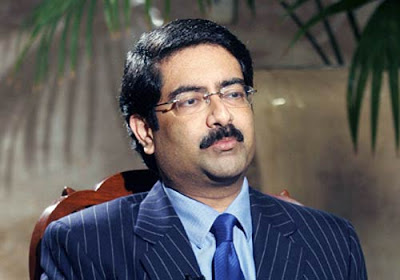From the mouth of the India based multinational conglomerate

Kumar Mangalam Birla
(The Author is chairman of Aditya Vikram Birla Group)
India's economic vision and forceful assertion are critical after US downgrade leading to global stock market crash
An unmistakable phenomenon of our times has been the sharp accentuation of uncertainty about the future course of the global economy. The events of the past two weeks say it all - the impasse of the US Congress on debt reduction, the consequent downgrading of the US by S&P, a global stock market crash, a 15% collapse in oil prices and sharp rise in gold prices
Clearly, such pronounced volatility is highly disruptive, both for the global economy and for business.
This is a schizophrenic economic world. The developed economies are mired in high unemployment, slow growth and high fiscal deficits.Asia and other emerging economies are experiencing high growth and a relatively better fiscal situation. While one part of the world is trying to induce growth with loose money, another part is fighting inflation with tight money
This is a schizophrenic economic world. The developed economies are mired in high unemployment, slow growth and high fiscal deficits.
Capital moves quickly and effortlessly. But labour is much less mobile: some countries face a shortage of labour, elsewhere there is a surplus. Short term capital flows are exacerbating volatility, triggering capital controls.
Exchange rates are becoming a weapon of choice, leading to "currency wars".China
Exchange rates are becoming a weapon of choice, leading to "currency wars".
Today's colonists chase natural resources. China
The most troubling and visible component of inflation is food prices. Dwindling farming populations, drought in many countries and growing populations have led to record food grain prices, aided by commodity price speculation.
Over the next three to five years, we will have to reckon with sub-par growth in most developed economies. Currency and commodity and oil price fluctuations will become more pronounced. The dollar will cede some ground to Yuan and euro.
The most troubling and visible component of inflation is food prices. Dwindling farming populations, drought in many countries and growing populations have led to record food grain prices, aided by commodity price speculation.
Over the next three to five years, we will have to reckon with sub-par growth in most developed economies. Currency and commodity and oil price fluctuations will become more pronounced. The dollar will cede some ground to Yuan and euro.
Nuclear power will wind down, natural gas and coal become prominent. China Africa .
Perhaps the enthusiasm for freer trade will diminish considerably. The broad direction of global policy will be to address the disruptions of extreme and unfettered free markets, particularly in finance.
India
Perhaps the enthusiasm for freer trade will diminish considerably. The broad direction of global policy will be to address the disruptions of extreme and unfettered free markets, particularly in finance.
We need renewed focus on the basics of domestic development: drinking water, health care, sanitation, transportation, urban infrastructure and education. Meeting the gap in these sectors alone can keep India
Agriculture's share of GDP is less than 15%, but almost half of our population depends on it for their livelihood. We need urgent reform in agriculture
Agriculture's share of GDP is less than 15%, but almost half of our population depends on it for their livelihood. We need urgent reform in agriculture
We must go on an overdrive to develop India
On a war footing, we need to address the issues related to energy and raw material security. That means speeding up domestic exploration and acquiring energy and raw material assets overseas
On a war footing, we need to address the issues related to energy and raw material security. That means speeding up domestic exploration and acquiring energy and raw material assets overseas
Finally, India India India India India
In sum, I want to say that India
Credit : ET